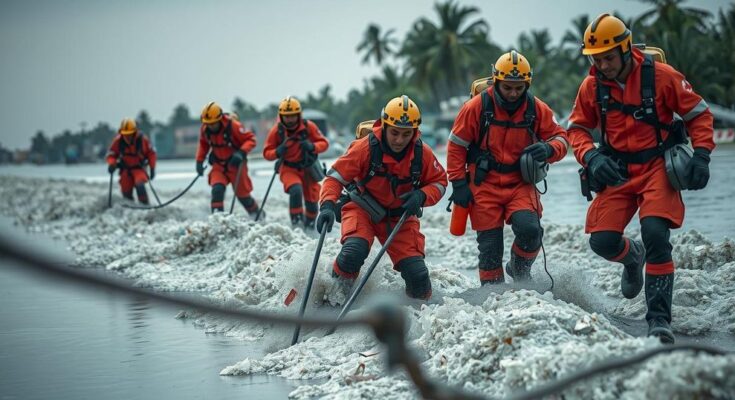The death toll from Tropical Cyclone Chido has risen significantly in Mozambique and Mayotte, with fears of casualties reaching thousands. Over 200 Red Cross volunteers are missing, complicating rescue operations in already impoverished areas. French President Macron plans a visit to address the political ramifications of the disaster, while humanitarian efforts focus on restoring essential services amid widespread devastation.
Tropical Cyclone Chido has wreaked havoc in the regions of Mozambique and Mayotte, a French overseas territory, leading to a rising death toll. Local authorities in Mozambique and Mayotte are estimating the possibility of casualties reaching thousands, with initial reports indicating at least 22 confirmed deaths and over 1,400 injuries in Mayotte alone. The French Red Cross has reported that more than 200 of its volunteers are unaccounted for in the aftermath of the storm. Rescue operations are urgently underway as officials attempt to restore essential supplies of food and water amid the chaos.
The cyclone struck Mayotte, characterized by wind speeds up to 220 kilometers per hour, leaving parts of the territory inaccessible and complicating rescue efforts. The local mayor, Ambdilwahedou Soumaila, underscored the urgency of addressing emerging health risks posed by decomposing bodies in the community and the prevalent issues of hunger and lawlessness. Over 75 percent of Mayotte’s population resides in impoverished conditions, heightening their vulnerability during such disasters. The French government has announced a curfew to maintain order in affected areas as recovery efforts progress.
Following its impact in Mayotte, Cyclone Chido moved onwards to Mozambique, causing further destruction and reporting at least 34 fatalities. The United Nations Office for the Coordination of Humanitarian Affairs (OCHA) noted that 174,158 individuals have been affected in Mozambique, where winds reached astonishing speeds of up to 260 kilometers per hour. The humanitarian crisis in areas already grappling with challenges, notably Cabo Delgado province, has intensified due to the cyclone’s destructive force.
Political implications surrounding the tragedy have emerged with French President Emmanuel Macron planning to visit Mayotte amidst growing frustration about immigration policies and inadequate disaster preparedness. Local officials, including politician Estelle Youssouffa, have expressed concerns about the underreported number of undocumented victims who feared seeking safety in shelters. Macron’s visit and ongoing debates regarding environmental and socio-economic issues highlight the widespread ramifications of Cyclone Chido’s destruction.
Cyclone Chido represents one of the most severe natural disasters in recent history, particularly affecting the French territory of Mayotte and neighboring Mozambique. This cyclone has led to widespread devastation, revealing underlying socio-economic vulnerabilities in these regions. The French government faces criticism regarding its handling of immigration and disaster readiness, especially for marginalized populations. Efforts to restore supplies and aid in recovery are paramount as local authorities strive to mitigate the impacts of this calamity, which has drawn international attention to the plight of the affected communities.
In summary, Tropical Cyclone Chido has led to significant loss of life and widespread destruction in Mozambique and Mayotte, with local authorities preparing for potentially catastrophic increases in casualty figures. The recovery efforts are hindered by damaged infrastructure and socio-economic challenges. The incident has sparked political discourse in France regarding immigration and disaster preparedness. As humanitarian responses begin, the focus remains on restoring essential supplies and addressing health risks stemming from the disaster.
Original Source: www.abc.net.au




